The HVAC industry is growing in Utah, and now is the time to seriously consider becoming an HVAC service tech. Heating and air conditioning service technicians can work with a licensed HVAC contractor. This trade has a starting pay of $20 to $25 per hour immediately after finishing training.
If you are looking for steady work and excellent pay, entering the HVAC field in Utah is a great option to consider. If you are great at math and have mechanical skills along with the willingness to work hard, you can be successful as a heating and air mechanic.

How to Become HVAC Certified in Utah
An HVAC technician is someone qualified to
- Repair heating, cooling, or ventilation systems and maintain and keep check of their functionality.
- Install new units or systems in case the old ones fail.
- Properly check the units and systems installed.
A career in the HVAC field as an expert technician is pretty great. And Utah is one of the best places to practice it. A technician can work easily and requires no license, but anyone who wished to work in this field as a contractor does. Some things to keep in mind about a contractor’s license are:
- It needs to be issued and approved by the licensing department of the state, called the Utah Division of Occupational and Professional Licensing.
- It is a contractor license with a specialization in cooling and heating systems.
You also need to give an exam to get the license. For that, you need to first apply and fulfill the conditions required. There are a total of five categories that an aspiring HVAC contractor can select from in Utah. These are:
- S350 – HVAC Contractor
- S351 – Refrigerated Air Conditioning Contractor
- S352 – Evaporative Cooling Contractor
- S353 – Warm Air Heating Contractor
- S354 – Radon Mitigation Contractor
While the S350 consists of different specializations except for S354, the rest are dedicated to the specifics named in them.
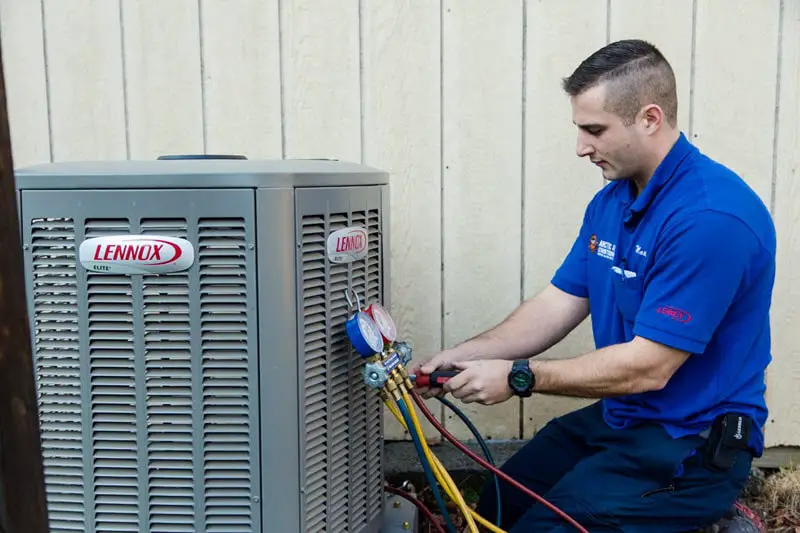
Utah also requires all of its contractors to have EPA Certification. This certification is required by Section 608, which states that the person can work safely on different units and systems, even those containing refrigerants. There are different types of EPA certifications, including:
- Type I HVAC Certificate
- Type II HVAC Certificate
- Type III HVAC Certificate
- Universal HVAC Certificate
There are also optional certifications available, such as the North American Technical Excellence Certification, also called NATE. This proves that you have received training and know-how to handle common units.
Why is Utah a Great Place to Start an HVAC Career?
It is a great place to start an HVAC career because of the following reasons:
Practical Learning
People going through the process of gaining an HVAC certification are not just subjected to books and theories. This is a job requiring them to know the ins and outs of installing, repairing, maintaining, changing, and checking systems, units, and machinery. And for that, they require some practical, hands-on experience.
Challenging
Operating and working with any kind of machinery requires lots of learning and is truly challenging. You need to come up with ways to repair a damaged unit, maintain it, remember how to check it, install it, etc.
All these tasks expose the technician to several risks and situations where they have to be on their toes. So it’s a job that definitely tests your abilities and therefore has incredible room for learning and growth in the long term.
Stability
As long as there are buildings, houses, and industrial factories, there will always be a need for ventilation, heating, and cooling. HVAC experts are always in demand, as they are responsible for making a building comfortable and ventilated, especially commercial ones.
They need heating or cooling systems all year round, and they also need to be maintained and repaired at times. So you can be certain that you will have a stable and steady job.
Licensure Procedures
In Utah, the HVAC license is a primary class of contractor’s license. The Division of Occupational and Professional Licensing located in Salt Lake City awards it. Refrigeration is a different class. There are also various subclasses under the HVAC license.
Contractors must provide proof of liability insurance and workers’ compensation insurance. The contractor’s business must register with the Utah State Tax Commission, the Utah Department of Employment Security, the Internal Revenue Service, and the Utah Division of Corporations.
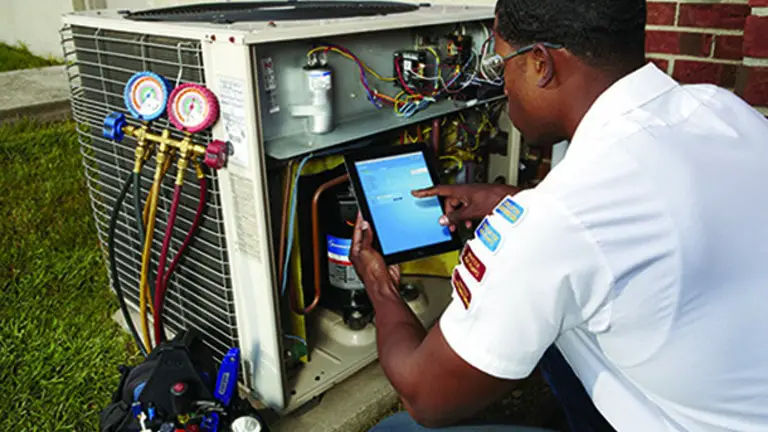
The contractor’s business must also show proof of the DBA registration with the Utah Division of Corporations. They must submit a financial statement and three credit reports for all personnel.
After meeting the initial requirements, the contractor must sit for and pass the business and law exam as well as a trade exam. Contractors in the HVAC industry must have proof of four years of full-time work experience in the field. You can also get your license through reciprocity if you have a license in a few other states.
The application fee for a primary classification license is $200. Additional classification applications cost $100 application fee.
Renewing your license requires six hours of continuing education courses. To renew a contractor license, you can include up to three online course hours from the Continuing Education Courses for the Construction Trades provided by the state government of Utah to fulfill the renewal requirements. Three of the continuing education hours must be earned through attending and participating in a live seminar.
Categories Of HVAC Contractor License in Utah
Utah has various types of HVAC-related contractor licenses, depending on the system you plan to work with:
- S350 – Heating, Ventilation and Air Condition
- S351 – Refrigeration Air Conditioning
- S352 – Evaporative Cooling
- S353 – Warm Air Heating
- S360 – Refrigeration
EPA Requirements
All HVAC technicians across the nation must obtain Section 608 EPA certification. This certification tests the technician’s knowledge of how to safely recover refrigerants. It also tests their knowledge of how to charge refrigeration systems.
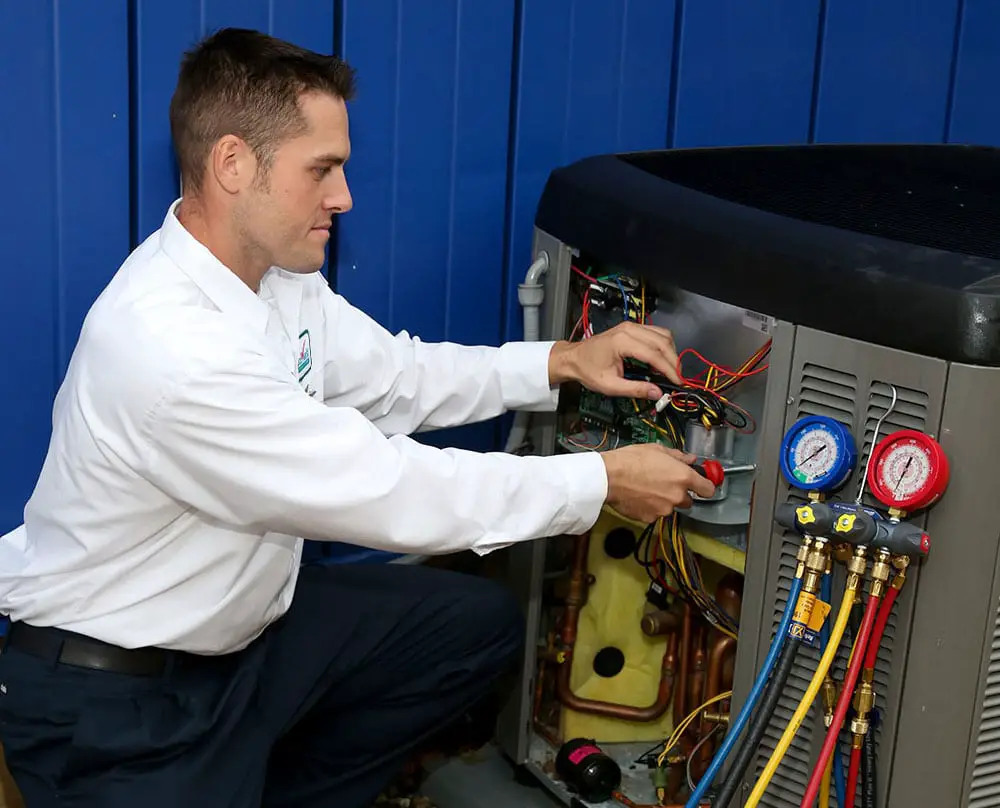
Refrigerant technicians must be certified in order to legally purchase refrigerants. It is wise to obtain universal certification so that you can service refrigerant appliances of all sizes. Individually, there are three types of certification. Type I certification is certification for technicians to service the small appliances. Type II certification covers high-pressure appliances. Type III certification allows technicians to service low-pressure appliances.
Each of these categories covers specific refrigerants that must be handled properly according to the Environmental Protection Agency’s standards. EPA Section 608 training includes record keeping rules based on the amount of refrigerant that has been added to each appliance. This training is available in all 50 states. The certification is valid across the country.
HVAC Exam Preparation in Utah
As mentioned before, if you wish to work as a technician, you do not require a license. But if you choose to be a contractor, a lot of resources are available for you to prepare for an exam in Utah.
Also, you need to know that schooling is not a requirement to obtain a license in Utah.
The things that make you eligible to apply for the exam are:
- Four years of work experience as a tech over the last ten years.
- Experience from working with a licensed and certified, professional HVAC contractor.
- Courses from the Utah Contractor License School.
After you have gained experience, you are allowed to apply to Utah‘s occupational and professional licensing department.
This application requires the following things.
- Evidence of working experience.
- Proof of financial responsibility and liability and workers’ compensation insurance.
- Evidence of your registration at UDC.
- A non-refundable fee of $210 and a $195 lien fee for when the application is filed.
Once your application gets accepted, exam date will be assigned to you. You can study for it by yourself, or you can take online courses to help.

Examination Process
To be licensed to perform work as a contractor in the HVAC industry in Utah, your application to sit for the exam must be approved by the Division of Occupational and Professional Licensing. The application must include payment of testing fees.
Testing fees are $79 for the business and law exam. The business and law exam is an open book test featuring multiple choice questions. These exams ensure that contractors are knowledgeable of state and federal laws and accounting procedures. The Utah’s Contractor’s Reference Manual can be used. Be sure to buy one in advance. There are practice exams available as well.
On the exam day, you are allowed to bring along copies of the ACCAs, the international code of mechanics and HVAC manuals inside the center.
The first exam that you have to take is the HVAC one, which is three hours long and consists of 70 questions, out of which you need to get 53 right to receive a license. The second exam is for the laws of business and is in two parts. The first one is two hours long and has 60 questions. The second exam is open-book.
Job Outlook and Salary for HVAC in Utah
Due to extreme weather conditions in Utah, HVAC techs are always in-demand.
They usually have a pretty good income and are paid enough to live comfortably. But it is nothing too extravagant, as it is still a salary-based job.
What Do HVAC Techs Get Paid in Utah?
The average range of a technician’s income can go as low as $18,957 or as high as $80,913 per year. Most of the people are paid a figure within this range. But there are variations when it comes to cities and the employee’s experience.
Entry-Level
For entry-level technicians in Utah, the average income range is from $26,354 to $36,064, with the annual median income being $32,663.
Mid-Level
The average income for mid-level technicians is from $32,365 to $51,784, with $45,625 being the annual median income.
Master-Level
On average, the annual income of a senior or master-level HVAC technician ranges anywhere from $32,827 to $58,719, with $47, 095 as the annual median income. This is the range in which most of the companies pay their senior employees.
Utah Cities with Highest Average HVAC Salaries
All the cities of Utah have different average HVAC salaries, depending primarily on work nature, experience in the field, qualifications, etc. Some cities offer incredible pay. Here are some top-paying cities:
Salt Lake City
Has an annual salary range from $53,480 to $85,510.
Provo
The annual salary is in a range from $46,500 to $61,350.
Monticello
The annual salary is within a range of $45,570 to $63,990 for most technicians here.
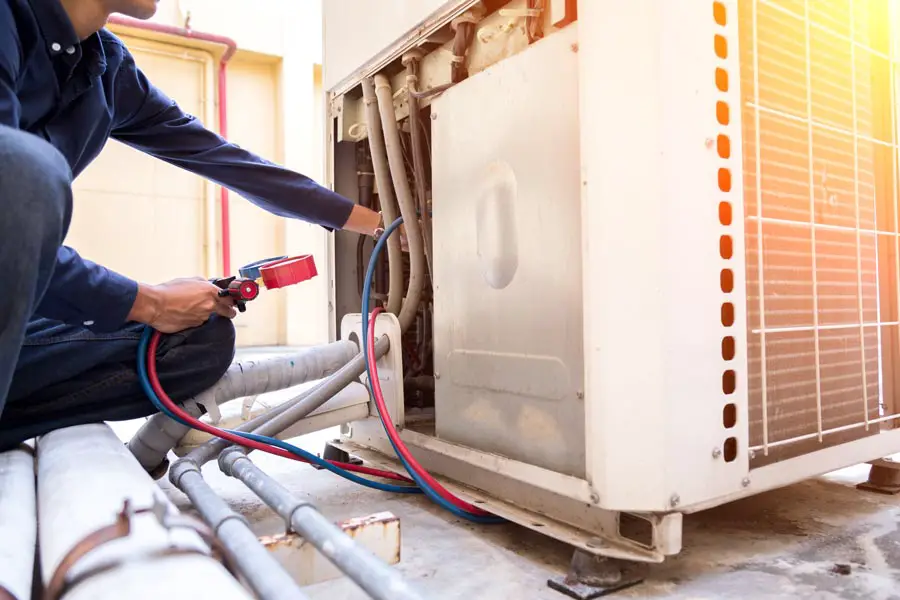
Ogden
The annual salary ranges from $43,760 to $63,500.
Delta
The annual salary is from $37,520 to $55,210. This is a good pay range.
HVAC employees usually get paid up to $10,000 additional for overtime. They also get bonuses as a part of their income. These can include hauling services, free fuel, paid holidays, insurance of 401k standard, and much more.
Insurance and Tax Information for HVAC in Utah
As an HVAC expert, even if you work diligently, human errors and accidents are inevitable. Problems may arise, accidents may occur, or there could be circumstances that could cause problems between your workers. For all that, you could be held liable.
To ensure that you can take care of things, you need to have the HVAC Contractor Insurance, so you can bear the costs of the damage or take responsibility for the problems and solve them conveniently. There are multiple types and kinds of insurance policies available, which are listed below. It is recommended that contractors carry at least one of them.
Commercial General Liability
This policy is the bare minimum. Every contractor should have this insurance. It protects you from:
- Injuries caused by a third-party
- Property damage
- Installation and repair issues
- Damage caused by moisture
For example, if you or your worker damages a client’s property while installing a new system, you will need to take care of the damage. This insurance policy will cover the cost of those damages, leaving you with fewer things to worry about.
Commercial Property
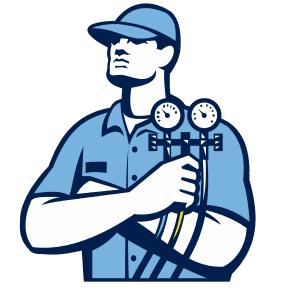
Ideal for your building or the property where you run your business, this policy saves you from damage caused by unseen events. It is an essential policy as it can cover the cost of damages to your property or your client’s property at the business-site, like damage caused to your HVAC system by a huge tree falling.
Errors and Omissions
This is also referred to as the Professional Liability insurance. It comes in handy in case a client makes claims of negligence against you or your workers. It can be about improper repair, installation, or maintenance of a system or because of a problem caused by the system itself.
The client can rightfully file a lawsuit if they believe that the damage caused by you is not justifiable. For that case, this policy will cover legal fees and settlements.
Worker’s Compensation
As suggested by its name alone, the worker’s compensation policy is especially crucial if you have employees working under you. It protects your business from any kind of liability that may be caused to an employee.
For example, an employee becomes sick or gets injured while working. This sick employee will be compensated by paid sick leaves and other such policies.
What a Utah HVAC Contractor Can Do
The Utah Plumbing and Heating Contractors Association is a professional organization for plumbers and HVAC service technicians who work with the public in Utah. Contractors are able to work on both residential and commercial projects. They are able to provide HVAC plans for the ductwork in new construction. The HVAC contractor can hire service technicians to install new HVAC systems or dispatch them to repair existing systems.
Contractors are businessmen who oversee projects that they have been hired to do. Independent contractors are able to obtain work on their own as their own boss.
HVAC technicians are able to check for leaks in cooling systems and add refrigerants if necessary. To work on complete systems, they should work under a contractor licensed in this area.
They can also expand their business and hire employees. These employees are trained to perform installations or replacement of equipment. Contractors are business owners who are responsible for the work that is performed by their employees.
Those contractors trained to work on industrial-sized units are able to work on large air conditioning units in facilities like hospitals or factories. Each of these units requires specialized care for routine maintenance.
Technicians are able to service the units to extend their useful lifetimes.
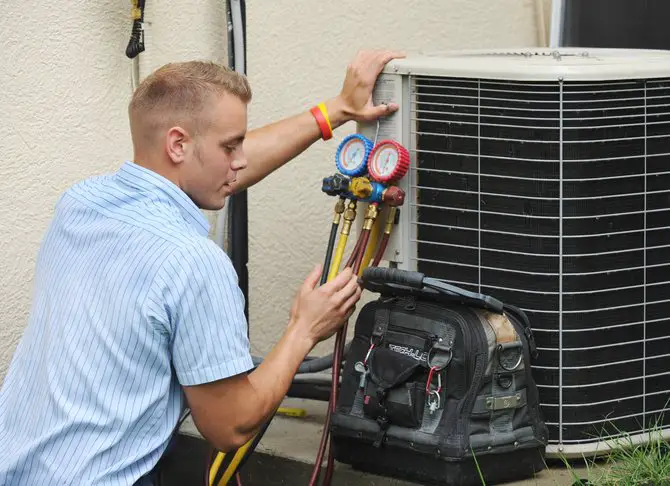
Keeping the conditioned air flowing at comfortable temperatures year round is the primary goal of all HVAC technicians and contractors. When they have done their jobs well, the customers are able to feel the results of their hard work.
Trade exams are based on code and OSHA standards. Each of these trade exams is open book as well. The trade exam fee is an additional $79. After the application and testing fees are paid, the license is free and expires after two years on July 31 of an odd-numbered year. PSI Examination Services is responsible for administering the exams.
Conclusion
Prospective HVAC technicians and contractors must be licensed to practice in Utah. After fulfilling the required work experience and passing the tests, HVAC technicians may become contractors who run their own businesses.
If you choose to be your own boss, your earning potential is limited only by your own personal work ethic and the hours and number of dedicated employees that you decide to hire. Being your own boss is its own reward, but you can reap the profits and enjoy your lifelong career.
People Also Ask
Even though we have tried our best to explain everything, there may still be some things that our readers want to clear up. So below, we have answered a few common questions.
You need a minimum experience of at least four years working in the relevant field. You also need to pass the licensing exam. This will give you a license which you will have to get renewed every two years. So, approximately a total of four to five years is required.
The eligibility criteria for the test in the HVAC S350 category consists of:
Experience and expertise of four years, or if you have taken courses in Utah
Proof of work experience
Proof of liability and insurance for worker’s compensation
Proof of financial responsibility
Evidence of registration at Utah Division of Corporations
Application fee of $210, which is non-refundable
Lien fee of $195 for when the application is filed
No, schooling is not required to become an HVAC technician in Utah.
Looking For Information On Nearby States?
You might also be interested in HVAC licensing requirements in bordering states:
